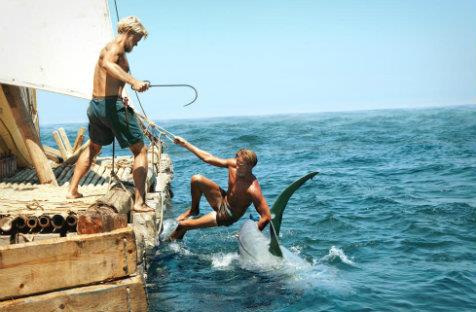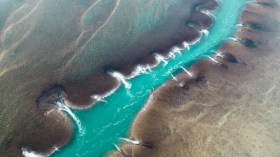Thor Heyerdahl’s remarkable expedition across the Pacific Ocean on a raft made of balsa wood has courted Oscar attention not once but twice, in both factual and fictional guises. Footage shot during the Norwegian explorer’s 1947 journey comprised the film Kon-Tiki, which won the Academy Award for Best Documentary Feature in 1951. Six decades later, Joachim Rønning and Espen Sandberg (Max Manus: Man of War) dramatised the adventurer’s exploits, earning a best foreign language feature nomination. Again titled Kon-Tiki after Heyerdahl’s raft, the film recreates his efforts to sail from Peru to Polynesia.
While studying the Fatu Hiva populace during the 1930s and 1940s, Heyerdahl (Pål Sverre Hagen, I Travel Alone) coined an idea regarding their origins. Defying anthropological theory, he proposed that they migrated from South America by following the ocean’s currents, rather than migrating out of Asia as widely accepted. Heyerdahl’s unproven thesis was ignored by publishers, with one suggesting he make the trip himself to support his notion. In 1947, the determined Norwegian attempted just that, on a hand-made vessel built from materials available 1500 years earlier.
Written by Petter Skavlan (When Bubbles Burst) with Allan Scott (The Fourth Angel) assisting, Kon-Tiki starts slowly, providing context for Heyerdahl’s mission. The recurrent theme of faith overcoming scepticism is telegraphed early as the film charts a childhood dice with a watery death; themes of fortitude and persistence are similarly spelled out in later years as Heyerdahl seeks validation and finance. Such formative scenes struggle to maintain momentum despite providing comic moments; however the excursion itself arrests the malaise. Once the feature takes to the sea it shines, in classic ‘against the odds’ fashion.
The transition to the water also reveals why the film ranks as Norway’s most expensive screen production to date, with the cost evident in Geir Hartly Andreassen’s (Så olika) striking and sophisticated cinematography. As sweeping as the treatment of the underlying tale, the glossy visuals are impeccable, deftly canvassing the perils and pleasures of ocean life, soaring around the isolated boat, and moving in closer for intimate – and apparently completely fictional – dramatic moments.
Unfortunately, despite its sense of adventure and ambition – both on and off screen – Kon-Tiki lacks depth, rendering its characters as a means to an end. Charismatically played by Hagen, Heyerdahl remains the only figure of note; shipmates Herman (Anders Baasmo Christiansen, North), Bengt (Gustaf Skarsgård, The Way Back), Erik (Odd Magnus Williamson, Reprise), Knut (Tobias Santelmann, Escape) and Torstein (Jakob Oftebro, Journey to the Christmas Star) are treated cursorily at best, as is his wife Liv (Agnes Kittelsen, Happy, Happy). Although the resonance of the true story still triumphs, the emotional connection is lessened. Kon-Tiki proves an entertaining and intriguing escapade, albeit one content to skim the surface of its subject.
Rating: 3 stars
Kon-Tiki
Director: Joachim Rønning and Espen Sandberg
UK / Norway / Denmark / Germany, 2013, 118 min
In cinemas April 11
Distributor: Transmission Films
Rated M
Actors:
Director:
Format:
Country:
Release:





